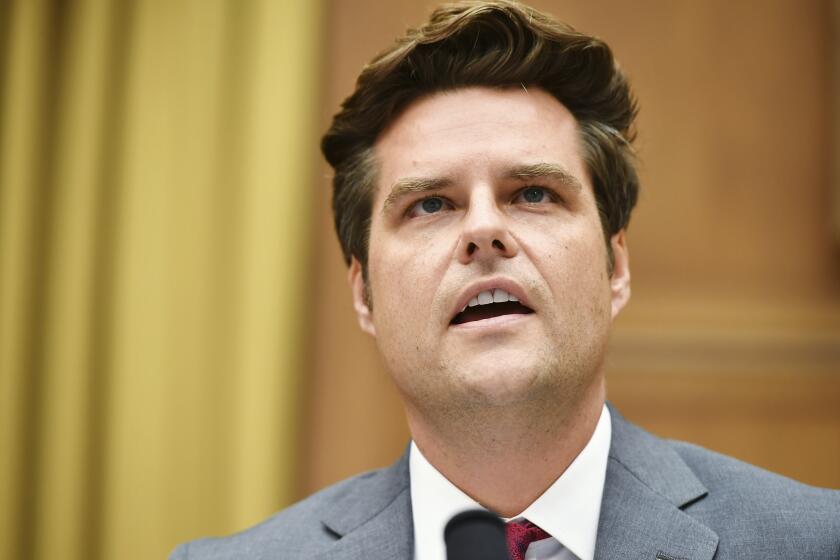Editorial: The recall election is a new chance for anti-reformers’ old lies about ‘soft on crime’ California

The argument from recall supporters that crime in California is out of control and that it’s Gov. Gavin Newson‘s fault ought to sound familiar.
Interests with a political or ideological stake in the rollback of this state’s historic reforms have been trotting out some version of that same false, fear-based argument for just about a decade. The refrain began after Newsom’s predecessor successfully crafted a plan to prevent federal courts from seizing control of state prison gates and releasing tens of thousands of prisoners early without regard to the seriousness of their crimes or the degree to which they had be rehabilitated.
In those 10 years, crime in California continued to plummet, subject to a few minor upticks, until last year, when homicide rocked the entire nation amid the disruption of the pandemic. California was not immune and has seen killings jump, commensurate with increases in cities and states and in urban and rural areas, regardless of any differences among their criminal justice policies.
Most other crimes here continue to fall. Even shoplifting, though you’d think otherwise from the hysteria kicked up by conservatives and recall candidates over some high-profile cases.
The attempted Newsom recall is merely the newest wrapper for some of the same stale junk food that Californians have been offered by criminal justice reform opponents and that voters have wisely rejected again and again.
It was that way in 2013, when Republican gubernatorial candidates targeted then-Gov. Jerry Brown’s “realignment” program, which assigned to county jails some felons who otherwise would have gone to state prison. Former Lt. Gov. Abel Maldonado’s campaign was typical, citing a series of brutal crimes committed by people released from prison supposedly because of realignment.
But politicians who campaign on false fears of crime generally concern themselves more with emotion than with fact, and the facts were that Brown’s program didn’t release anyone from jail or prison early. Voters got wise to Maldonado, and he dropped out of the race.
Californians also kept steady in the months after they adopted Proposition 47 in 2014, and police unions and Republican politicians howled that they had done two dangerous things. One was making simple possession of illegal drugs for personal use a misdemeanor, as it had once been before. Voters knew what they were doing when they ended long prison terms for substance use disorders.
The other Proposition 47 feature was resetting the dividing line between petty theft and grand theft to $950, still among the lowest and therefore toughest in the nation, especially when compared with supposedly tough-on-crime states like Texas ($2,500), Alabama ($1,500), Georgia ($1,500) and South Carolina ($2,000). In fact, the felony theft threshold is higher in two-thirds of other U.S. states than in supposedly soft-on-crime California. If the felony threshold is to blame for crime here, why are the higher thresholds not blamed for crime in all those red states?
The one comprehensive study into the effect of Proposition 47 on crime found no relationship.
Voters were paying attention last November too, when opponents of criminal justice reform brought forward Proposition 20 to roll back realignment, Proposition 47, and Proposition 57, passed by voters in 2016. All the same, tired arguments were trotted out, from all the usual sources: police unions, tough-on-crime elected prosecutors, out-of-state Republicans. Voters wisely said no.
Now added to the same old arguments are complaints about defunding the police, and the assertion that the political movement that grew following last year’s police killing of George Floyd in Minneapolis, among others, has made our elected leaders strip resources from police departments.
Except that — no, they haven’t. Police budgets have not declined, and police deployment has not been pulled back. There has been talk about doing those things, but for the most part law enforcement budgets remain intact. For example, the $150 million reallocated from the Los Angeles Police Department to various other programs was not a net reduction to the department’s budget, which increased this year, as did officer pay. When candidates run against police defunding, they are running against a phantom.
What does all of this have to do with Newsom? Pretty much nothing. The governor has little role in local police budgeting. When blaming Newsom for all of the reforms to which the governor was peripheral, candidates are really running against facts, liberalism and Democrats in general.
Newsom has indeed played some important roles in criminal justice reform, including his plans to close two prisons — a fiscally conservative move, given the decline in the prison population — and appointing Democrat Rob Bonta as attorney general . Bonta is up for election to a full term next year. If you enjoy the falsehoods about criminal justice reform lobbed at Newsom this summer, don’t worry — you’re sure to hear them again in a few months in the attorney general race.
More to Read
A cure for the common opinion
Get thought-provoking perspectives with our weekly newsletter.
You may occasionally receive promotional content from the Los Angeles Times.










